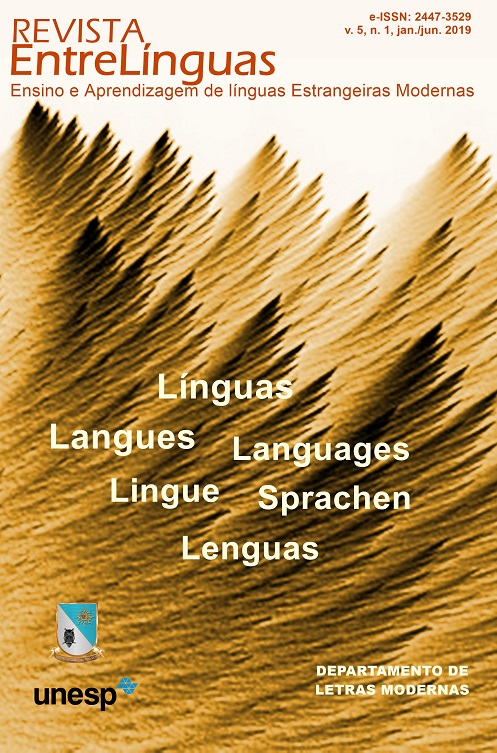Teaching and learning english and the native speaker decentralization
DOI:
https://doi.org/10.29051/el.v5i1.12603Keywords:
Teaching, Learning, English language, Speaker, Decentralization.Abstract
This paper is a brief reflection about the teaching and learning of English. It highlights the presence and relevance of learning this language nowadays, to take part in several actions which are engendered through this language. Under the light of Applied Linguistic, it puts in check the native speaker as mythical creature and suggests its decentralization in the English language context, aiming at legitimizing the new speaker of this global language. To warm this reflection, it takes as base the global lingua franca status that English achieves in the contemporaneity, and therefore, for a better implementation of this process, this paper discusses fundamental issues, such as identity, ideology, native and non-native speaker. This reflection converges to the fact that it is necessary to break with hegemonic patterns, because this approach is outdated, and to learn to teach a more local English.Downloads
References
ANJOS, F. A. Desestrangeirizar a língua inglesa: um esboço da política linguística. Cruz das Almas: EdUFRB, 2019.
BARCELOS, A. M. F. Finding my own voice and accent. 1995. Disponível em: https://old.hltmag.co.uk/jun08/sart03.rtf. Acesso em: 31 de agosto 2019.
BERNAT, E. Towards a pedagogy of empowerment: The case of 'impostor syndrome'. Elted, vol. 11, p. 1-8, 2009.
COGO, A. English as a lingua franca: concepts, use, and implications. ELT Journal. Vol. 66/1, p. 97-105, 2012.
CRYSTAL, D. English as a global language. USA: Cambridge Universi¬ty Press, 2a ed. 2012.
FAIRCLOUGH, N. Language and Power. England: Longman Group, 1998.
JENKINS, J. English as a lingua franca: attitude and identity. Oxford, UK: Oxford University Press, 2007.
JENKINS, J. English as a lingua franca: interpretations and attitudes. World Englishes, v. 28, p. 200-207, 2009.
JENKINS, J. English as a língua franca from the classroom to the classroom. ELT Journal, p. 486-494, 2012.
RAJAGOPALAN, K. Por uma linguística crítica. Linguagem, identidade e a questão ética. São Paulo: Parabola, 2003.
Downloads
Published
How to Cite
Issue
Section
License
Os manuscritos aceitos e publicados são de propriedade da Revista EntreLínguas. Os artigos publicados e as referências citadas na Revista EntreLínguas são de inteira responsabilidade de seus autores.
Transferência de direitos autorais – autorização para publicação
Caso o artigo submetido seja aprovado para publicação, já fica acordado que o(s) autor(es) autoriza(m) a UNESP a reproduzi-lo e publicá-lo na EntreLínguas, entendendo-se os termos “reprodução” e “publicação” conforme definição respectivamente dos incisos VI e I do artigo 5° da Lei 9610/98. O artigo poderá ser acessado pela rede mundial de computadores (Internet), sendo permitidas, a título gratuito, a consulta e a reprodução de exemplar do artigo para uso próprio de quem a consulta, desde que haja a citação ao texto consultado. Essa autorização de publicação 328 EntreLínguas, Araraquara, v. 1, n .2, p. 323-328, jul./dez. 2015 não tem limitação de tempo, ficando a UNESP responsável pela manutenção da identificação do(s) autor(es) do artigo. Os artigos publicados e as referências citadas na Revista EntreLínguas são de inteira responsabilidade de seus autores.











